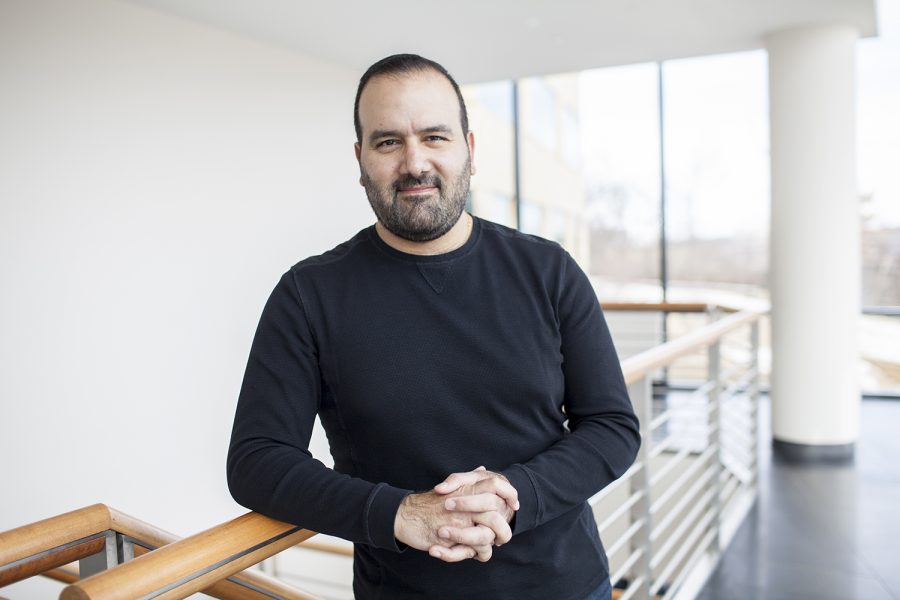Minimum wage affects child development, public health research team shows
A team of researchers within the field of public health have organized a plan to determine the legitimate effects of the federal and state minimum wages on birthweight, child development, and more.
UI professor George Wehby poses for a portrait at the College of Public Health on Wednesday, March 6, 2019. Wehby is leading a two year project, alongside UIChicago Professor Robert Kaestner, that studies the effects of minimum wage on long-term child health and development.
March 11, 2019
Researchers at the University of Iowa have been testing the minimum wage to see its effects on child development.
The team is formulated of three investigators: George Wehby, a UI professor of health management, Robert Kaestner, a research professor at the University of Chicago Harris School of Public Policy, and Dhaval Dave, a professor of economics at Bentley University.
Dave said the team’s ideas stemmed from a joint NBER meeting with Betsey Stevenson from the Council of Economic Advisors. The meeting was held during the end of the Obama administration, he said.
RELATED: Iowa’s only pediatric physiatrist visits Coralville to help children with special needs
“She had briefly mentioned Obama’s executive order, which had raised the minimum wage for federal contractors to $10.10 with part rationale being that a higher wage would raise productivity,” Dave said. “And we all thought the same thing—that productivity reflects both work, efficiency, and human capital, as well as a worker’s health. If the minimum wage is raising workers’ incomes, then it would be plausible to think that it would have important downstream effects on many other outcomes, most notably health.”
Utilizing national data sets collected by general government agencies made available to researchers, the group has begun a two-year long project to examine their data.
“We have become interested in understanding how the minimum wage acts as an income enhancing policy, with a focus on low income individuals and families and how that may affect children’s health,” Wehby said. “The basic premise is that, for low income workers who earn below or around the minimum wage, increasing the minimum wage if they are working would mean higher income for them and could be linked to changes in their children’s health.”
Wehby noted the change in minimum wage would influence changes in consumption, residential stability, better parental health, less stress, child care services, and the use of health care services.
“But at the same time, there is a group of individuals who would not benefit from the minimum wage and who perhaps may find it harder to find employment about the minimum wage,” Wehby said. “There is still a debate in the literature about what the minimum wage does to labor outcomes—such as employment and earnings. We wanted to go beyond that and examine the effects on children’s health.”
The team acknowledged the fact that the minimum wage may have some adverse effects on some individuals. However, they said they recognized there is controversy among workers who continue to have their jobs, and that there is more evidence in an increase in earning.
Motivated by these facts, Wehby said, the team started looking at birthweights utilizing the universal birthweights in the US.
“In our first work, we found that there is a small, yet statistically significant positive effect,” Wehby said. “This is from data of nearly three decades. Based on that, we wanted to pursue further work to examine how outcomes of different stages of childhood—physical health, mental health, social health—could be affected by the minimum wage.”
Iowa’s minimum wage is currently at $7.25 an hour, in line with the federal minimum wage.
“This research is complicated, because there could be many other things happening in someone’s life,” Wehby said. “The changes in insurance programs, economic changes, unemployment cycles – making a lot of other variables that are changing. The statistical model we have created is designed in a way to pinpoint the effect of the minimum wage, while isolating and accounting for these other changes that can be happening.”
William Story, a senior colleague of Wehby’s in the UI College of Public Health, said the influence of social policy on health across the life course is a critical area of research because social policy often reflects the values of society.
“Minimum wage can have a direct impact on a number of social determinants of health—including economic stability, education, neighborhood safety, healthcare access, and availability of social capital—which, in turn, have a persistent relationship with long-term health outcomes,” Story said. “Demonstrating the connections between minimum wage, social determinants of health, and child health will be a tremendous contribution to the health and social policy landscape.”






